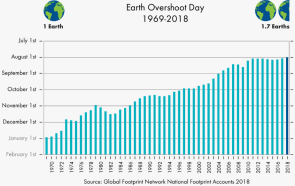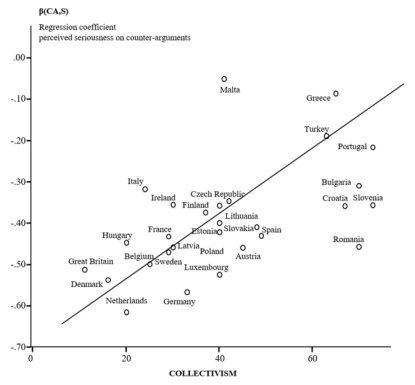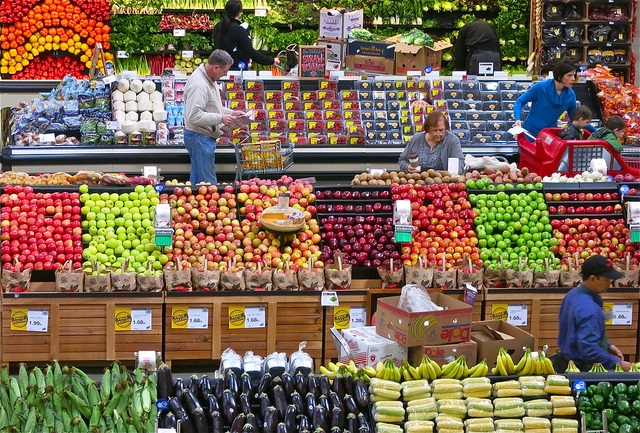
As we probably all know, we are currently consuming more than the planet can reproduce. The annual Earth Overshoot Day is happening sooner every year. Last year this day was 1 August. Less consumption or more sustainable consumption lifestyle is therefore necessary, because we have only one planet.
Given the dramatic ecological and climatic implications, many policy makers and non-governmental organizations are trying to enhance consumers’ knowledge about the harmful consequences of this excessive consumption behavior. However, educating consumers is often insufficient to change consumption habits.
Earlier this year I have related sustainable consumption to happiness and health in my blog Sustainable consumption to be happy and healthy Today I want to discuss the relationship between sustainable consumption, knowledge, seriousness and culture based on an international study by Lasarov et al. (2019).
Knowledge is essential, but perceived seriousness matters
Knowledge is essential for consumers to understand sustainability issues and how to increase sustainable consumption behaviour. However when policy makers or companies are trying to raise the knowledge-level of consumers, it appears not to be effective. These messages are often interpreted as moral-laden or paternalistic to the average consumer who aspires to retain consumption habits. Highlighting the seriousness of climate change and its consequences proves to be a much stronger lever to achieve consumption behaviour.
Dealing with counter-arguments
Sometimes consumers generate counter-arguments to avoid changing their behaviour towards a more sustainable lifestyle, despite their knowledge and their perceived serioursness. These counter-agruments can be:
- Denial of the effect:
Consumers might argue that the implications of climate change for the environment and consumers’ everyday life have been exaggerated. Biased assimilations such as these can be sparked by the media, politics, etc. - Denial of the cause:
Consumers may ask whether or not humankind is responsible for climate change, by arguing that current CO2 emissions have only a marginal impact on the world climate and that there has been a considerable variance in the global temperature. - Small agent:
If humankind is responsible for climate change, individuals might ask whether or not they are individually responsible. Consumers may argue that climate change is an unstoppable process that cannot be changed through their behaviors and they thus deny their responsibility for climate change consequences. - Justification by comparison:
Consumers can argue that they see reasonable ground that their choice of product or way of living is still better than other choices or ways.
With regards to knowledge consumers can be quite defensive and use counter-arguments as a defense mechanism for not changing their behaviour. Looking at perceived seriousness ( how serious consumers perceive climate change and its
consequences) consumers are less likely to develop counter-arguments to justify and retain their current (over)consumption patterns in face of these environmental problems.
Culture matters in using counter-arguments to avoid change
Consumers with strong social values (collectivism) are generally less prone to generating counter-arguments. Individual cultures do however use counter-arguing more often when knowledge or perceived seriousness is raised. In the picture below it shows that Social values in The Netherlands are more individual (low collectivism) and show less emphasis to the public opinion. Individual decisions by consumers will therefore be more heavily based on their subjective beliefs and justifications of them. Counter-arguing is therefore more closely linked to subjective knowledge and perceived seriousness.

How to stimulate sustainable consumption?
Stimulating sustainable consumption, by policy makers or companies, can not be done adopting a single strategy. Depending on the level of knowledge and perceived seriousness and the culture of the consumer a specific strategy should be formulated.
Countries that score high on collectivism and are less prone to counter-arguing can best be influenced by direct policies to raise their knowledge. Countries that score high on individualism and indulgance can be be approached by addressing the seriousness of climate change.
Literature
Lasarov, W., Mai, R., de Frutos, N. G., Egea, J. M. O., & Hoffmann, S. (2019). Counter-arguing as barriers to environmentally motivated consumption reduction: A multi-country study. International Journal of Research in Marketing.
Cover photo by: Dean Hochman, Supermarket @Flickr
Photo by Roderick Eime, shopping – Andres Rodriguez / Dreamstime


